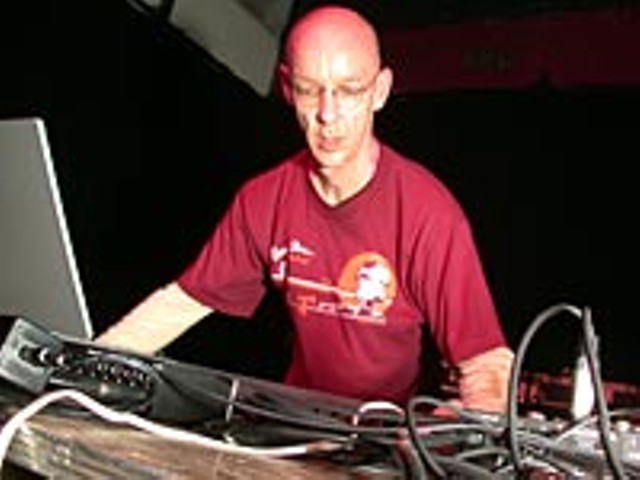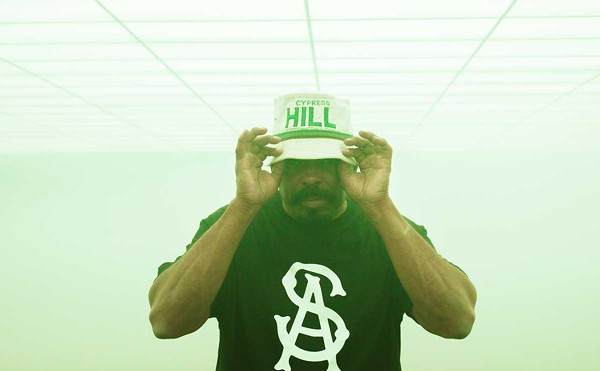Maybe it has something to do with youth, but it’s rare to hear a jazz band that plays all-original music. Ann Arbor-based Urban Transport refuses to build a set from recycling old songs. This is noteworthy at a time when too many local jazz ensembles play it safe and rely on standard material.
The instrumental foursome, whose average age is around 25, compose music regularly — if not relentlessly — and bring fresh songs to their live sets. That way, they say, the listener experiences something new with each live performance.
The group’s co-founder, trombonist Vincent Chandler, says drummer Sean Dobbins, alto saxophonist Dean Moore, and bassist Josef Deas, are able to keep their music interesting and stimulating by writing music — sometimes spontaneously — that reflects their personal experiences.
“Sometimes you can play a song and it may be a good song, but it’s not what you’re feeling at the moment,” explains Chandler. “We try to keep up to date with our new life experiences and what we are feeling. What we feel in our heads and in our hearts is what we are trying to be.”
At the risk of sounding gushy, Urban Transport’s ability to swing is reminiscent of the Jazz Messengers. They are a compelling study of skilled musicians who play off each other as much as they play for the song.
And people are catching on. They gig to packed houses at Baker’s Keyboard Lounge and the Firefly Club. At the 2003 Ford Detroit International Jazz Festival their reception was huge.
At their shows, the group is bombarded with requests for their own music. Hence, a self-released CD, which should be out early next year. “We have so much original music that we feel it’s time to get it documented,” explains Moore.
Such Urban Transport originals as “The Beast,” and “Deciduous” are hard-bop inspired, but the instrumentation — particularly the alto sax and the trombone at the front — gives the compositions a modernistic bent. Sometimes they compose on the spot. At a recent Baker’s show, they closed the second set with “Urban Transport,” an original that didn’t have a melody — so they made one up. The tune came off as if they had rehearsed it for months.
“They are very tight and well-rehearsed,” says Baker’s owner Johnny Colbert. “They are the fastest-rising band in the metro Detroit area. The fact that they play only original music is very rare, and it shows you their rising strength. We are following their progress by booking them here once a month.”
The members have distinct ways of communicating with their instruments.
Saxophonist Moore puts his horn through a vigorous workout, a style that is a combination of saxophonists Sonny Stitt and Paul Desmond. When he solos, it sounds as if he playing duets with himself.
“Dean was the first member of the band to take the lead voice,” says Chandler. “He is brave in an era where most alto players want to sound like Kenny Garrett. Dean avoids trying to sound like Kenny even though he respects Kenny.”
At 20, Josef Deas is the youngest member of Urban Transport. Since becoming a bass player, Deas says he has surrounded himself with more experienced players; for him, learning is foremost. Onstage the bassist becomes animated. He props his bass against his shoulder like it’s a wounded soldier and plucks away with the precision of a tailor picking lint from an expensive wool suit. It’s apparent that Deas is always conscious of those around him — there is a tangible musical connection with the other musicians, as if he can read their minds.
The bassist says there’s no trick to this. “Just through gigging and having conversations with these guys, I know a lot about them now. And I know as a bass player what they want to hear from me, and what kind of support that they need.”
Some drummers just want to wail. Sean Dobbins is the opposite. He understands the importance of restraint, and complements Chandler’s style.
“A lot of drummers don’t listen to me because I don’t play like other horn players. I need a lot of support,” says Chandler. “Sean has taken the time to learn my style, and he knows how to accompany me.”
Deas continues, “There’s an old-school quality to Sean’s playing that I always hear in terms of swing. He plays above the time, and he plays a lot of ideas. He’s a textural drummer. Sean addresses texture a lot when he solos. But he really deals with locking down a good, comfortable, bouncy feel. Almost like Art Blakey, but Sean is still hip and modern.”
Chandler, on the other hand, directs the flow. Although Urban Transport is a democracy, Chandler is clearly the leader, and the most accomplished. At 33, he’s the elder statesman of the band. He studied at the Thelonious Monk Institute, toured with saxophonist Joe Henderson, and played with the Lincoln Center Jazz Orchestra.
“Everybody has an opportunity to contribute to the band whether it’s musically, concept-wise, or work-wise,” says Chandler. “Everybody has a chance to hustle up gigs, and everybody has a chance to compose music.”
Chandler says it’s all about supporting each other, looking at the group as a whole. “We all support each other’s dreams. Whatever Sean wants to do with the music we will do. And the same thing applies to Dean and Josef.”
Deas says that while Chandler doesn’t fashion himself the Urban Transport leader, he still respects him as such. “With me he takes on that father-figure role.”
Deas explains a song Chandler wrote for him called “JD.” He says that although Chandler isn’t a bass player, the writing is phenomenal. “He doesn’t know how to play the bass. I was reading through the chart and all the notes are in the right place on the bass. It almost like he knew where my fingers were going to be. He can write for other people.”
Chandler himself is a lyrical horn player. He plays fast lines, which is difficult for a trombonist. His legato passages are striking too; it’s as if Chandler is trying to keep pace with what’s going on in his imagination.
“I use the same tools as anybody else to learn how to play jazz and to improvise,” says Chandler, “but I’m not trying to play like other trombone players. When I’m playing my best, I always know what the music is going to sound like. That’s what I’m chasing after. In essence, I’m aspiring to be me.”
Initially, Urban Transport was the Vincent Chandler Septet. Chandler hired musicians who were available, and they only played his music. After some modest local success, Chandler’s septet split up last year.
Chandler then formed Urban Transport. He says the name was chosen to reflect the group itself: forward movement, constant change. “I felt it was the perfect name for the band because we have four musicians writing original music from their urban experiences.”
Chandler and Moore are the Urban Transport front men. They got on immediately when they met five years ago at the University of Michigan. Soon after they started hanging out at jam sessions where Chandler was already popular and where Moore was building a reputation.
“Vincent and I have a very similar concept,” says Moore. “The way that we write sits perfectly for the rest of the members in the group. By listening to his songs it helps me be become inspired and to hear other things to write.
“Vincent has always been a mentor to me,” he continues. “He’s somebody that I’ve always looked up to musically.”
Over the last year, Urban Transport has earned a reputation as a top jazz ensemble. And they want to continue to grow as both writers and performers. And it’s not just the youth talking when Chandler and Urban Transport say that they finally are at a point where they want to learn how to play music. That’s called wisdom.
“We are all at a point where we have been playing music for years. But then you finally get to the point where you learn how to play music.”
Urban Transport will perform Saturday, Dec. 13, at Baker’s Keyboard Lounge (20510 Livernois, Detroit). Call 313-345-6300 for info.
Charles L. Latimer writes about jazz for Metro Times. Send comments to [email protected]




